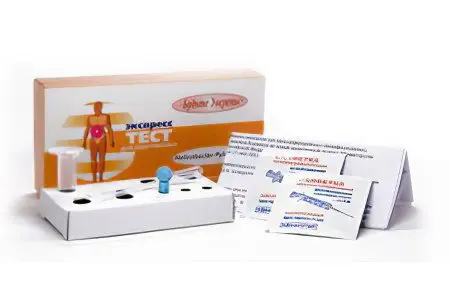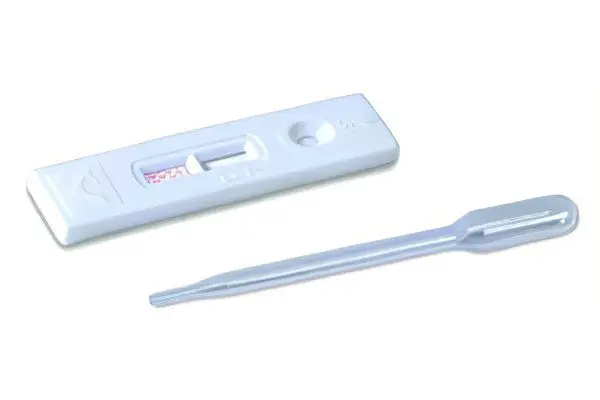Contents

Many people still remain firmly convinced that stomach ulcers and gastritis are the result of dietary errors or the result of an unhealthy lifestyle. In fact, it has long been proven that most often inflammation of the gastric mucosa is caused by pathogenic microorganisms called Helicobacter pylori. This bacterium lives in the stomach, destroying its wall and leading to serious diseases.
Helicobacter pylori is responsible not only for gastritis and stomach ulcers, but also for oncological changes in the digestive system. However, today there are methods of treatment to get rid of the microorganism. Before starting therapy, you should make sure that the patient is really infected with Helicobacter pylori.
Not always a modern person has time to go to the doctor to undergo a comprehensive diagnosis. Moreover, not all medical institutions in the country conduct non-invasive studies aimed at detecting Helicobacter pylori. Often, therapy is prescribed without a diagnosis. The modern pharmacological industry offers people who suspect that they have Helicobacter pylori to independently purchase and perform express tests at home. These tests are low cost, easy to use, and if used correctly, the reliability of the result can be equated to 100%.
Doctors do not consider the results of rapid tests for Helicobacter pylori as a basis for prescribing therapy. However, the presence of symptoms of infection and a positive home test result should warrant a comprehensive evaluation of the patient.
Who needs a rapid test for Helicobacter pylori?

The fact that a person is infected with Helicobacter pylori, he can find out many years after the infection has occurred. For years, the bacterium is able to live in the human stomach without showing itself in any way. Its pathological effect on the gastric wall is extended in time. In many ways, the severity of symptoms of infection depends on the strain of the bacterium itself, as well as on the reactivity of the human immune system.
It should be taken into account that almost 100% of the adult population has certain problems with the digestive organs. Not always pathological symptoms from the stomach and intestines indicate infection with Helicobacter pylori. It is possible that they really arise against the background of errors in nutrition.
However, there are also symptoms that should suggest the need for testing, among them:
Stomachache. At first, the pains have a weak intensity, do not last long. A person does not pay any attention to such discomfort. When infected with Helicobacter pylori, pain most often appears at a time when the patient is hungry and his stomach is empty. Also, painful sensations can disturb immediately after a hearty meal. Acute pain is characteristic of severe inflammation of the gastric wall or stomach ulcers.
Belching. When infected with Helicobacter pylori, belching worries a person very often, giving him some discomfort. It may not be associated with eating and be accompanied by the appearance of a sour smell.
Heartburn. If Helicobacter pylori is present in the stomach, then heartburn will occur frequently and last for a long time. It is difficult to eliminate it with the help of medication.
Nausea and vomiting. These symptoms can be very pronounced. A person feels sick on an empty stomach and after eating. Helicobacter pylori themselves cannot cause vomiting, but they contribute to the disruption of the work of all organs of the digestive system, including the pancreas.
Allergic reactions. Since bacteria produce toxins in the course of their life, a person may develop a tendency to allergies, which was not there before. This is expressed by rashes on the skin, skin itching and irritation.
Over time, symptoms that indirectly indicate infection with Helicobacter pylori will progress. Therefore, it is necessary to identify the bacterium in the body in time and get rid of it.
Express test for the detection of Helicobacter pylori in the blood

A visit to a laboratory or other medical institution for testing for the detection of Helicobacter pylori is not required. You can buy a test at a pharmacy. It is not at all difficult to do it at home.
The test allows you to detect antibodies to Helicobacter pylori in whole blood.
The tests most often include:
Indicator tablet, which is packed in an individual vacuum bag.
Reagent for diluting the obtained blood sample.
Pipette for adding blood to the tablet.
Scarifier suitable for single use.
Antiseptic wipe.
Instructions for use.
If the test was stored in the refrigerator, then it must be kept at room temperature for 20 minutes before use. Then the dough is taken out of the package and laid out on a dry, clean and even surface. The indicator window should be at the top.
Hands should be washed with soap, after which the package with a disposable antiseptic wipe is opened and the finger is treated with it, from which blood will be taken.
The next step is to open the scarifier. With it, a small puncture is made on the tip of the finger so that blood comes out.
Blood is drawn into a pipette. One drop of liquid is enough to perform the study. It is entered into a round window located on the express test tablet. After the blood is in the indicator, 2 drops of the reagent are added to it. Leave the test for 15 minutes, after which you can evaluate the result.
A line appears in the test area of the tablet. If the line is one, then the person is not infected with Helicobacter pylori. If there are two lines, then the result can be considered positive. Thus, the total testing time does not exceed 20 minutes.
Rapid test for the detection of Helicobacter pylori in feces

It is possible to test for Helicobacter pylori using stool. In the feces of a person infected with a bacterium, there will be an antigen to which the device reacts.
The composition of the test for the detection of Helicobacter pylori in feces includes such components as:
A tube for collecting feces.
Gloves.
Reagent-solvent.
Instructions for use.
It should be taken into account that in order to increase the reliability of the results, preliminary preparation will be required.
It is not recommended to conduct a study earlier than one month after the completion of antibiotics. 3 days before the material is taken, it is recommended to exclude from the menu products that can increase gas formation. It is not recommended to take drugs aimed at enhancing intestinal motility.
If blood or bile is present in the feces, then this can distort the final result. Therefore, in case of intestinal pathologies, preference should be given to a rapid test for the detection of Helicobacter pylori in the blood.
Fecal sampling is carried out in any clean container; it is not necessary to sterilize it. About 125 g of feces are added to the test tube. To do this, you can use a cotton swab. The resulting material is poured with a solvent that comes with the test.
Shake the sample thoroughly to obtain a uniform consistency. Leave the tube at room temperature for 10 minutes. After the specified time, a few drops of the composition are applied to the indicator. It is left on the test for another 10 minutes. Now we can start evaluating the result.
If one strip appears on the test, then the result is regarded as negative, and if two stripes appear on the test, this indicates infection with Helicobacter pylori.
Naturally, a study conducted at home is not enough to prescribe treatment. However, if you receive a positive result, you must consult a doctor and inform him about the testing. The doctor will prescribe a comprehensive examination to the patient, as a result of which a decision will be made on the need for therapy.
Pros and cons of express testing

The rapid test for Helicobacter pylori has certain advantages, including:
There is no need to go to the hospital for testing.
The cost of such tests is not high, and the accuracy of the results is quite high.
The test is carried out quickly. The result can be assessed in 20 minutes.
The test is easy to use.
The disadvantages of this method include the fact that its results are not the basis for prescribing treatment. In addition, rapid tests do not allow assessing the degree of infection intensity, do not provide information about the state of the digestive system. They simply confirm or deny the fact of infection. Not every person can conduct a blood test, as some people experience panic fear at the sight of blood. Also, one should not exclude the possibility of obtaining a false positive or false negative result, which most often occurs when the instructions are violated.
In any case, you should always remember that getting infected with Helicobacter pylori is very simple, and the health consequences can be serious. Therefore, one should not hesitate to diagnose in the presence of symptoms of the disease.









